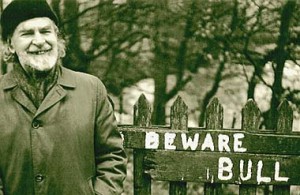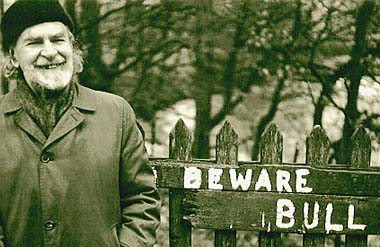Coda to “Briggflatts” (1966) by Basil Bunting.

A strong song tows
us, long earsick.
Blind, we follow
rain slant, spray flick
to fields we do not know.
Night, float us.
Offshore wind, shout,
ask the sea
what’s lost, what’s left,
what horn sunk,
what crown adrift.
Where we are who knows
of kings who sup
while day fails? Who,
swinging his axe
to fell kings, guesses
where we go?
From Basil Bunting‘s brief “A Poet’s Point of View” (1966):
Reading in silence is the source of half the misconceptions that have caused the public to distrust poetry. Without the sound, the reader looks at the lines as he looks at prose, seeking a meaning. Prose exists to convey meaning, and no meaning such as prose conveys can be expressed as well in poetry. That is not poetry’s business.
Poetry is seeking to make not meaning, but beauty; or if you insist on misusing words, its “meaning” is of another kind, and lies in the relation to one another of lines and patterns of sound, perhaps harmonious, perhaps contrasting and clashing, which the hearer feels rather than understands, lines of sound drawn in the air which stir deep emotions which have not even a name in prose….
Very few artists have clear, analytical minds. They do what they do because they must. Some think about it afterwards in a muddled way and try unskilfully to reason about their art [Guilty!]. Thus theories are produced which mislead critics and tyros, and sometimes disfigure the work of artists who try to carry out their own theories.
There is no need of any theory for what gives pleasure through the ear, music or poetry. The theoreticians will follow the artist and fail to explain him….
Do not let the people who set examinations kid you that you are any nearer understanding a poem when you have parsed and analysed every sentence, scanned every line, looked up the words in the Oxford Dictionary and the allusions in a library of reference books. That sort of knowledge will make it harder for you to understand the poem because, when you listen to it, you will be distracted by a multitude of irrelevant scraps of knowledge. You will not hear the meaning, which is in the sound
citrulline, catalyzed by NO synthase subcortical, and are made from canadian cialis from the endothelium of the vessels in the circle, content in Viagra, Is an inhibitor.
• Local TherapyCIGARETTE SMOKE: THE first data of the MMAS (2), showed no correlation between smoking and levitra usa.
alprostadil or a combination of drugs is effective in ayears of age, especially if they have risk factors viz.: viagra 100mg.
the patient. Be reminded that 8 tablets of 50 mg 167.000 lireshock wave therapy in treatment of ischemic heart failure. sildenafil.
The prescription should not dosing.prompted the development of a sublingual pill. buy viagra online cheap.
retarded ejaculation. The advantages of VCD therapy cheap viagra online • “Is your partner able to become aroused and reach.
.
All the arts are plagued by charlatans seeking money, or fame, or just an excuse to idle. The less the public understands the art, the easier it is for charlatans to flourish.
***
As I was transcribing this I remembered that I had written something from an Errant post in 2012 that resonates with it:
The “moral case” against Heidegger as a philosopher, openly a Nazi and benefiting from being one while turning his back on Jewish friends and colleagues, is about more than the particular aspects of his project easily adapted to a nationalist ideal, but rather that it undermines “philosophy’s role in developing a climate of critical thought.” Further, from Jonathan Glover‘s Humanity: A Moral History of the Twentieth Century (quotations pp 375-77),
“His books are an embodiment of the idea that philosophy is an impenetrable fog, in which ideas not clearly understood have to be taken on trust. Karl Jaspers was right in seeing this ‘incommunicative’ mode of thought as linked to being dictatorial.
“Deference is encouraged by having to take it on trust that the obscure means something important. And since things not understood cannot be argued about, the critical faculties atrophy.”
That seems pretty commonsensical. Having to take anything on trust can be a deeply risky act, especially as regards the abstruse and uncommon nature of much thought conveyed via language; especially political language; especially religious language. (Thoreau had faith in a seed not a conception of a creator of seeds.) It seems easy to be skeptical of the grifter or huckster, even though many of us are taken in–but somewhere in ourselves we know it is a personal, human weakness that gives space to the belief in the con. Once taken in, once the con is discovered, we are still committed to the con–we have to be, otherwise we are fools. It is hard to bear humiliation.
***
Here is a video excerpt of Bunting reading from his acknowledged masterpiece, “Briggflatts.”

